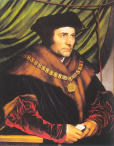









|
II. English Prose
1. Thomas More (1478-1535)
Life
 Thomas More was a typical
“Renaissance man”--a writer, scholar, statesman, diplomat, political
theorist and patron of the arts. He was the foremost English humanist of his
day. Thomas More was a typical
“Renaissance man”--a writer, scholar, statesman, diplomat, political
theorist and patron of the arts. He was the foremost English humanist of his
day.
More, son of Sir John More, a justice of the King’s
Bench, was born in 1478, in London. After his earlier education at St.
Anthony’s School, he was placed in the household of
Cardinal John Morton,
Archbishop of Canterbury and Lord Chancellor.
At the age of about nineteen, Thomas More was sent to Canterbury College,
Oxford, by his patron. There he learnt Greek until 1499 when More left
Oxford to study law in London, at Lincoln’s Inn.
In 1513 Thomas More, still Under-Sheriff of London, is said to have written
his History of Richard III. The book, it seems to show some knowledge and
opinions of More’s patron, Morton. It was not printed until 1557, when its
writer had been dead for twenty-two years. It was then printed from a MS. in
More’s handwriting.
In 1515 Thomas More was joined in a commission to the Low Countries with
others to discuss with the ambassadors of Charles V., then only Archduke of
Austria, upon a new agreement of alliance. On that embassy More, aged about
thirty- seven, was absent from England for six months, and while at Antwerp
he established friendship with Peter Giles.
More was a man of principle. While he remained as Lord Chancellor under King
Henry VIII, the king broke from the Catholic Church in order to divorce his
wife and marry Anne Boleyn, More refused to sign
the Act of Succession
and Supremacy. But the Act made still King Henry the “supreme head on earth”
of the English church. Since Henry was now head of both church and
government, More’s refusal was seen as an act of treason, and his head was
cut off. His final words on the scaffold were: "The King’s good servant, but
God’s First.”
Utopia
More’s Utopia was written in Latin. Utopia is in two parts, and the second,
describing the place Nusquama (in Greek, meaning “Nowhere”), was probably
written in 1515. The first part was written in early in 1516. A
philosophical mariner tells the story. He says he sails on the three of
Vespucci’s four voyages, remaining behind with others at a fort built at
the farthest point reached. From there, the mariner discovers a strange land
named Utopia. The first part of the book is a dialogue, a conversation
between the mariner and his listeners. The mariner tells his philosophy and
how his listeners react to his words. The second part is a straightforward
description of the island kingdom, where gold and silver are worn only by
criminals (as chains), religious freedom is total, and no one owns anything.
The book was first printed at Louvain, late in 1516 and was under the
editorship of
Erasmus, Peter Giles, and other of More’s friends in
Flanders. It was then revised by More, and printed by Frobenius at Basle in
November, 1518, but was not printed in England during More’s lifetime.
Utopia is the work of a scholar who had read
Plato’s Republic, and had
his fancy quickened after reading
Plutarch’s account of
Spartan life
under
Lycurgus. The whole work is really an exercise of the imagination
with much brilliant satire upon the world of More’s own day. Beneath the
cover of an ideal Communism, there lies a noble English argument. Sometimes
More talks of France when he wants to mean England. Sometimes there is
ironical praise of the good faith of Christian kings, only in this way that
the book can be published not forbidden as a political attack on the policy
of Henry VIII. Erasmus wrote to a friend in 1517 that he should send for
More’s Utopia, if he had not read it, and wished to see the true source of
all political evils. And to More, Erasmus wrote of the significance of the
book: it played a key role in the Humanist awakening of the 16th century. It
moved away from medieval ideal world toward Renaissance realistic place.
Utopia is a humanistic work. It is an academic performance, a literary
exercise, an attempt to describe the Platonic Republic in a new way. It can
be seen that Utopia was the product of the conditions More lived in, and
that it has an essentially modern character, and that the sameness to the
Platonic Republic is only in externals.
More was not only one of the most elegant Latin scholars of his time but
also was given a title as “the father of English prose”, as Sir James
Mackintosh calls him. Before writing Utopia, More had written works in
English. In 1510 he translated from Latin into English a biography of the
humanist Johan Picus, Earle of Mirandula, and in 1513 he wrote his famous
History of Richard III., which remained a fragment. This work was first
published in 1543, after More’s death, and at once became the classical
account of the time which it described. From it was derived the unflattering
portrait of Richard III., which Shakespeare has made immortal.
The rest of More’s English works were composed after Utopia. They originated
in the Reformation period. In these writings and dialogues More gave up the
humanist standpoint. It was employed as the national language, not for
science and art, but for politics.

|
![]()
![]()